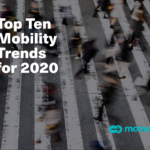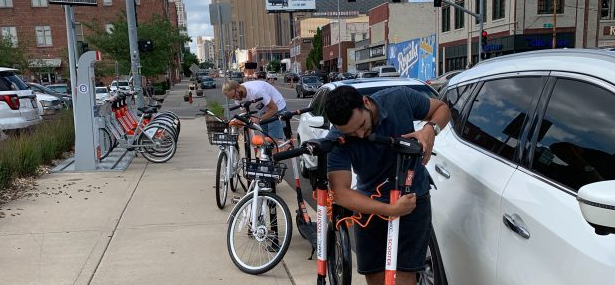Transit agencies are gaining key insights into how mobility innovation can be integrated into existing service, how mobility innovation can increase ridership, and how mobility innovation can complement the transit network.
App aims to help Chattanoogans with cognitive disabilities ride CARTA system independently
February 2020
Chattanooga, TN
The Department of Intellectual and Developmental Disabilities (DIDD), the City of Chattanooga, CARTA, Orange Grove Center and AbleLink Smart Living Technologies, LLC, unveiled a joint initiative designed to support people with cognitive disabilities in Hamilton County to navigate public transportation using mobile-application based enabling technology.
moovel’s Top Ten Mobility Trends for 2020
January 2020
With a focus on how transit can create better cities, moovel has identified 10 emerging mobility trends to look ahead to in 2020.
Supporting Late-Shift Workers: Their Transportation Needs and the Economy 
September 2019
Late-shift jobs play a crucial role for our nation. Yet many of these workers are also the segment of the population most at risk of being burdened by high transportation costs and reduced opportunities due to limited travel options. The lack of adequate late-night mobility options is costing both employees and employers. The need to own a car makes late-shift jobs unavailable (or unaffordable) for a segment of the American population. Commuting challenges also hit employers by increasing truancy and turnover, costing the U.S. economy billions of dollars a year. This report details what the late-shift is, who works the late-shift, why public transit is important to late-shift workers, and how public transit agencies can work with policy makers and the business community to address late-shift commuting needs.
Leveraging Big Data in the Public Transportation Industry
February 2019
APTA is undertaking an initiative on Big Data and the public transportation industry. As part of this initiative, selected APTA members engaged in a conversation on Big Data and its role in the industry. Roundtable discussions with public transit agencies and private sector APTA members provided valuable insight on this topic. APTA also conducted a survey of transit agency members. The survey revealed that 94 percent of agencies are using Big Data techniques and methods to improve their agency. Read the report.
Public Transit Increases Exposure to Automated Vehicle Technology
February 2019
This paper seeks to summarize and incorporate findings from several significant research works such as NCHRP’s Impacts of Laws and Regulations on CV and AV Technology Introduction in Transit Operations, FTA’s Transit Bus Automation Project: Transferability of Automation Technologies, and U.S. DOT’s Low-Speed Automated Shuttles: State of Practice. U.S. DOT’s Automated Vehicles 3.0 report is also referenced.
The Transformation of the American Commuter
December 2018
The American commuter is no longer required to settle for private automobiles as their main way of getting around.
More than three in four Americans (77%) see public transit as the backbone of a multi-transit lifestyle that includes current and future technologies such as ride-hailing (e.g. companies like Uber and Lyft), bikesharing, carsharing, autonomous vehicles (AVs) and other emerging technologies, according our new study The Transformation of the American Commuter.
Kansas City Area Transportation Authority: public-private collaborations to expand mobility services
2018
Kansas City, KS-MO
The Kansas City Area Transportation Authority (KCATA) is a bi-state agency created by a compact between the states of Missouri and Kansas. The KCATA is responsible for planning, construction, owning and operating passenger transportation systems and facilities within the seven-county Kansas City metropolitan area (Cass, Clay, Jackson, and Platte in Missouri; and Johnson, Leavenworth, and Wyandotte in Kansas). The agency operates RideKC bus service, the MAX Bus Rapid Transit service, Flex demand-response routes, RideKC Freedom paratransit service for the elderly and persons with disabilities, and RideKC Van vanpool service. Read the case study
City of Monrovia: Leveraging emerging ridesharing services to expand mobility options
2018
Monrovia, CA
The city of Monrovia, CA, offers a range of transportation options operated at the regional and local levels. On a regional scale, Los Angeles County Metropolitan Transportation Authority (LA Metro) operates the Gold Line light rail station, bus lines, and paratransit services; and . there is also a regional San Gabriel Valley bus service run by Foothill Transit. On the local level, the City of Monrovia launched in March 2018 the GoMonrovia program, a partnership with Lyft and LimeBike that provides subsidized on-demand ride hailing and bike sharing services. Read the case study
King County Metro Transit: expanding its role from service provider to mobility manager
2018
Seattle, WA
King County Metro provides a wide range of transportation options for the King County. It operates the region’s largest bus network, vanpools, paratransit services, and several programs to promote ridesharing. It also operates Sound Transit’s regional Express bus service and Link light rail in King County, along with the Seattle Streetcar. Read the case study
Automated Buses: Fantasy or Reality?
2018
Orlando, FL
A presentation for the Florida Public Transportation Association on Automated Buses. The presentation offers questions to think about regarding bus transit automation as well as examples of projects. View the presentation here
Mobility Summit: King County Metro Futures Cabinet
2018
Seattle, WA
New Mobility thought leaders convened in Seattle in November 2018. Leaders across the region gathered to explore how emerging technologies and new mobility options can improve urban transportation and to tackle the tough challenges associated with implementing smart mobility policies and projects. View Presentations and a video from the summit:




